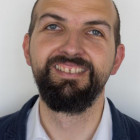Spotlight Talk
How To Identify and Address Safe Practices and Equity in AI for Education
Date Thursday, Nov 24 Time – Room: Pavillon
In this panel discussion we will explore the role that AI assisted technologies will play in the immediate future of education systems and how to identify and address safe practices and equity in AI.
AI assisted technologies will be needed to support an exponentially increasing lack of teachers globally, however, bias within these tools and unsafe data practices can limit certain learners and deny specific learner communities equal access to education: a fundamental right, which has already been challenged in the past two years by Issues of digital equity.

Gábor Kismihók
Head of Learning and Skill Analytics Lab, TIB – Leibniz Information Centre for Science and Technology and University Library, Germany
Gábor is the head of the Learning and Skill Analytics Lab at the TIB – Leibniz Information Centre for Science and Technology in Hannover, Germany. He has been concentrating his research efforts on the multi-disciplinary area of matching processes between education, labour market, and individuals. Within this field he has been carrying out research on 1) Artificial Intelligence (AI) and (in)formal learning 2), utilising Open Educational Resources (OERs) for upskilling and re-skilling individuals, 3) changing nature of work and its impact on education, 4) role of knowledge and the assessment of knowledge in bridging the education – labour market divide. A major output of these research efforts is eDoer, an open, AI driven learning platform: http://edoer.eu/. List of publications: http://kismihok.hu/
Links

Antonio Maratea
Lecturer, University of Naples Parthenope, Italy
Antonio Maratea has a Master's Degree in Statistics and a PhD in Information Engineering. Since 2008 he works at University of Naples "Parthenope", teaching mainly Databases and Data Science at the graduate and post graduate level. His recent research focus is on Rough-Fuzzy methods, Machine Learning and XAI.
Links

Vesa Paajanen
Senior Lecturer, University of Eastern Finland, Finland
Vesa Paajanen is a senior lecturer in animal physiology. In current position as a facilitator of online and blended learning at University of Eastern Finland he is using 50% of the working load on teaching higher education and rest time helping his colleagues to turn their teaching online and to develop pedagogically useful online learning environments. In higher education his is focused in Flipped Classroom & learning analytics to support each student in a personal way.

Stephen Downes
Researcher, National Research Council Canada, Canada
Stephen Downes works with the Digital Technologies Research Centre at the National Research Council of Canada specializing in new instructional media and personal learning technology. His degrees are in Philosophy, specializing in epistemology, philosophy of mind, and philosophy of science. He has taught for the University of Alberta, Athabasca University, Grand Prairie Regional College and Assiniboine Community College.
His background includes expertise in journalism and media, both as a prominent blogger and as founder of the Moncton Free Press online news cooperative. He is one of the originators of the first Massive Open Online Course, has published frequently about online and networked learning, has authored learning management and content syndication software, and is the author of the widely read e-learning newsletter OLDaily.
Downes is a member of NRC's Research Ethics Board. He is a popular keynote speaker and has spoken in three dozen countries on six continents.
Links
Moderator

Ildiko Mazar
Sector Consulting Manager, NTT Data, Spain
Ildiko has over 25 years of professional experience in the field of open education and e-learning, and she is particularly passionate about informed and transparent knowledge, skill and competence recognition. In the past 5 years Ildiko has been focusing mostly on supporting the development and uptake of innovative solutions in the fields of competence development and digital (micro-)credentialing, more specifically the European Learning Model and European Digital Credentials for Learning. She is member of the CTDL Advisory Board, and one of the 3 Co-Chairs of the W3C Credentials Community Group's VC-EDU task force.